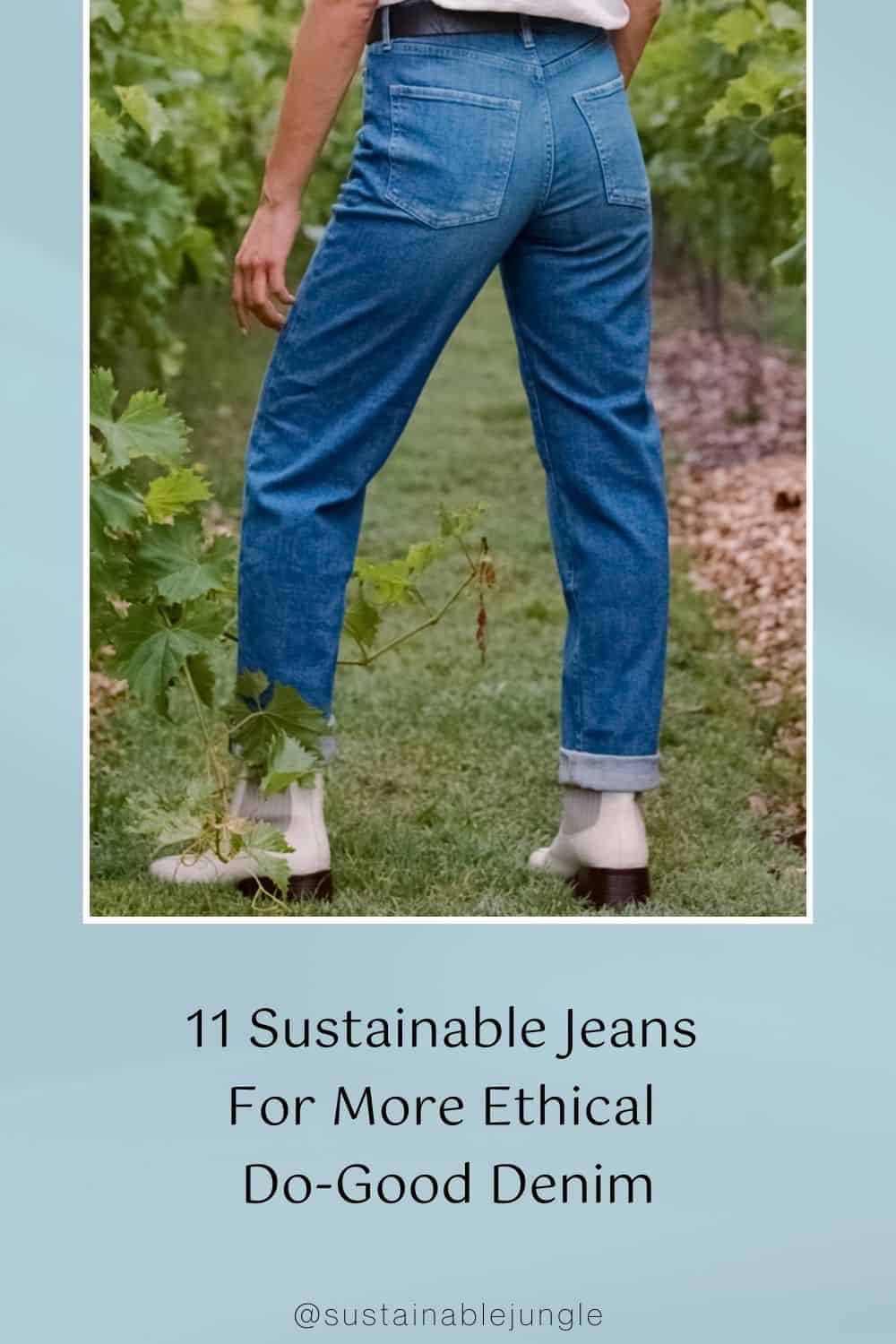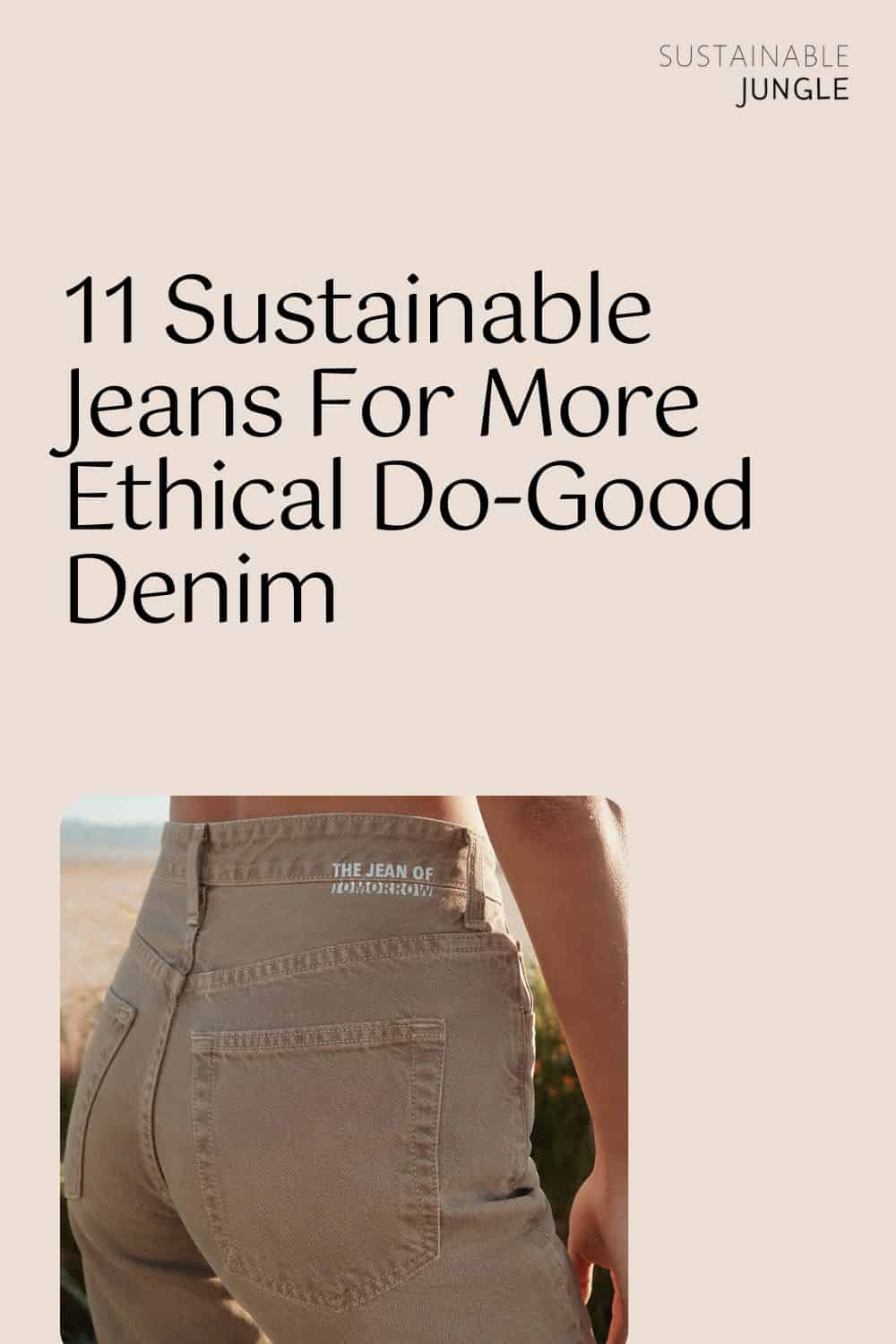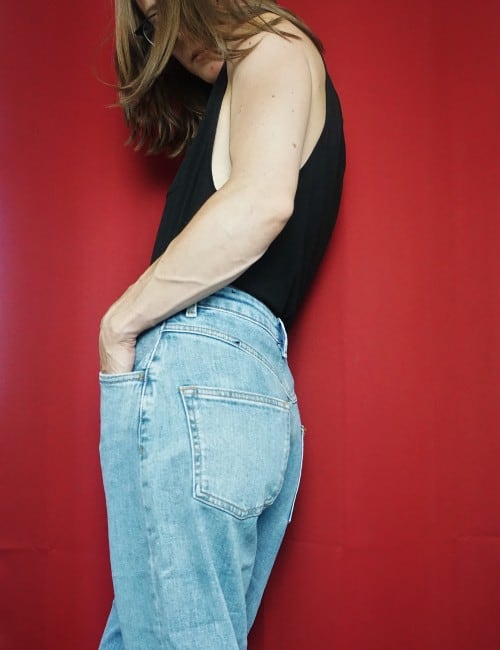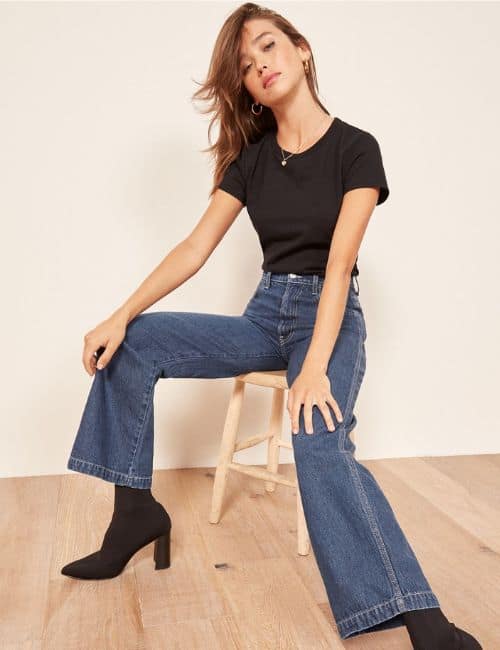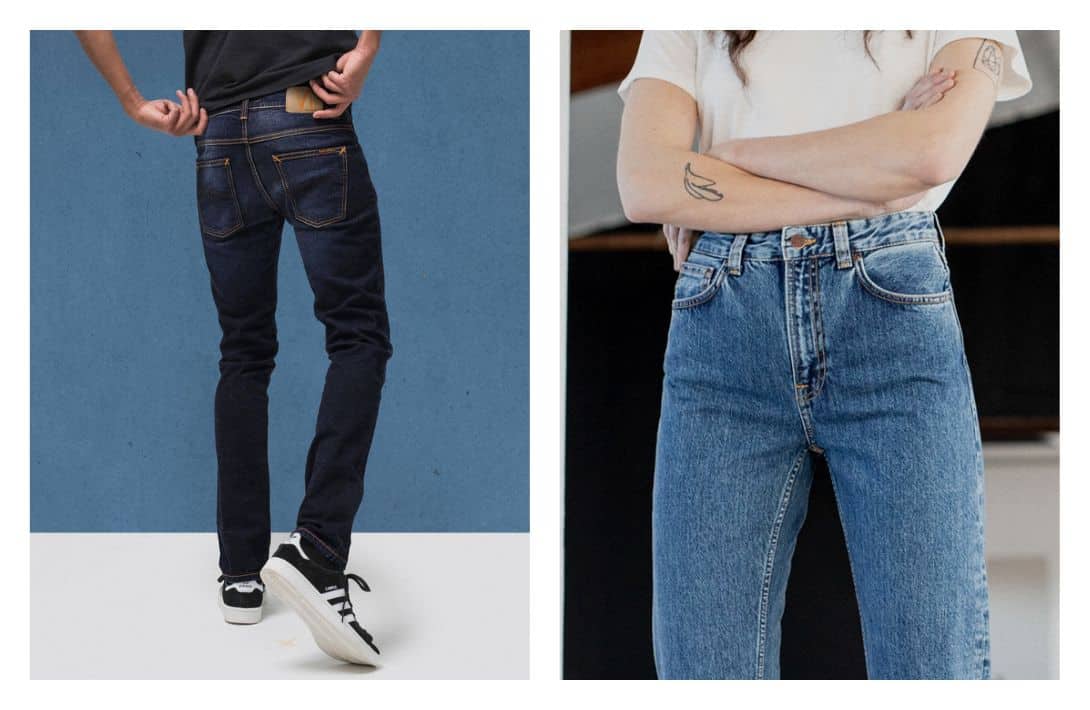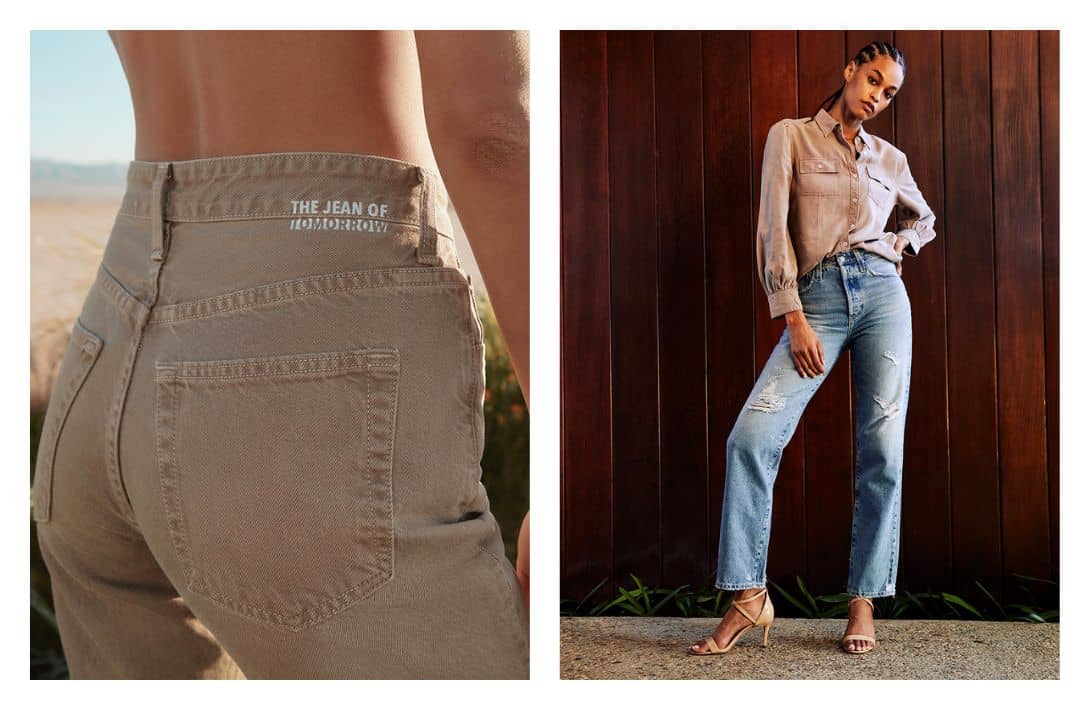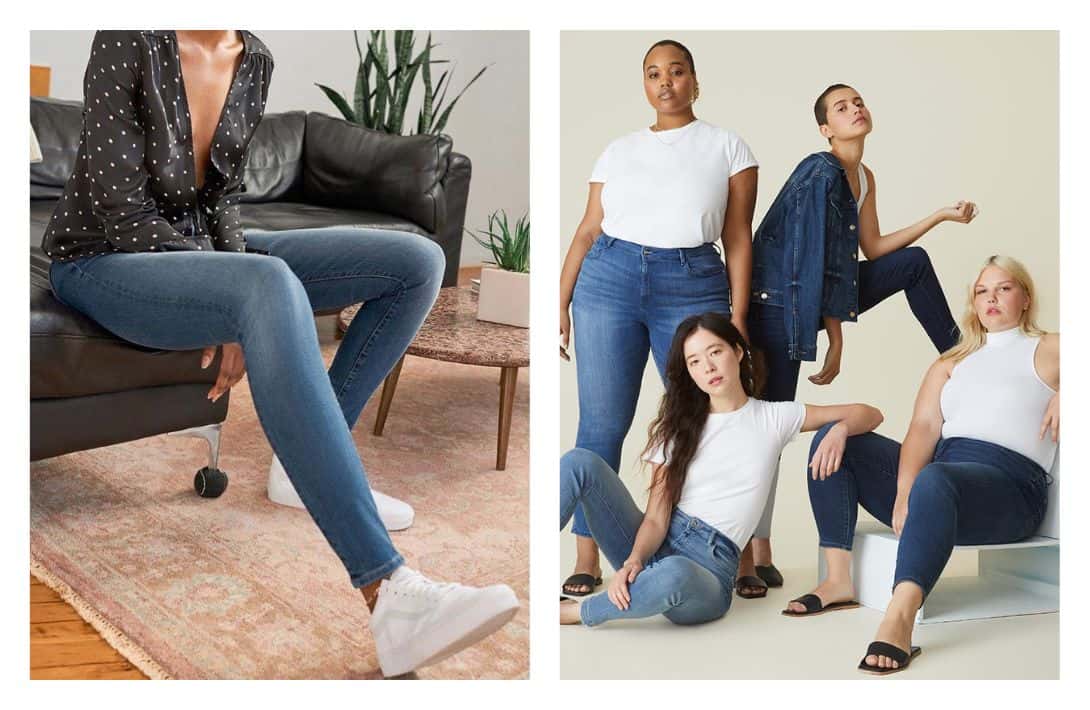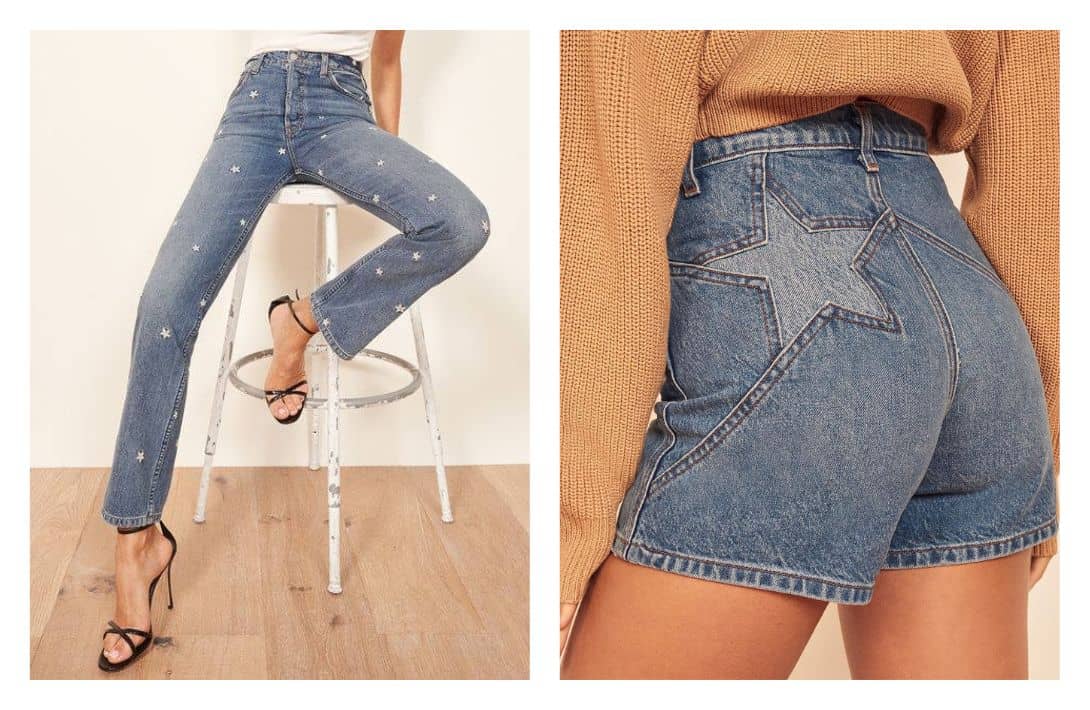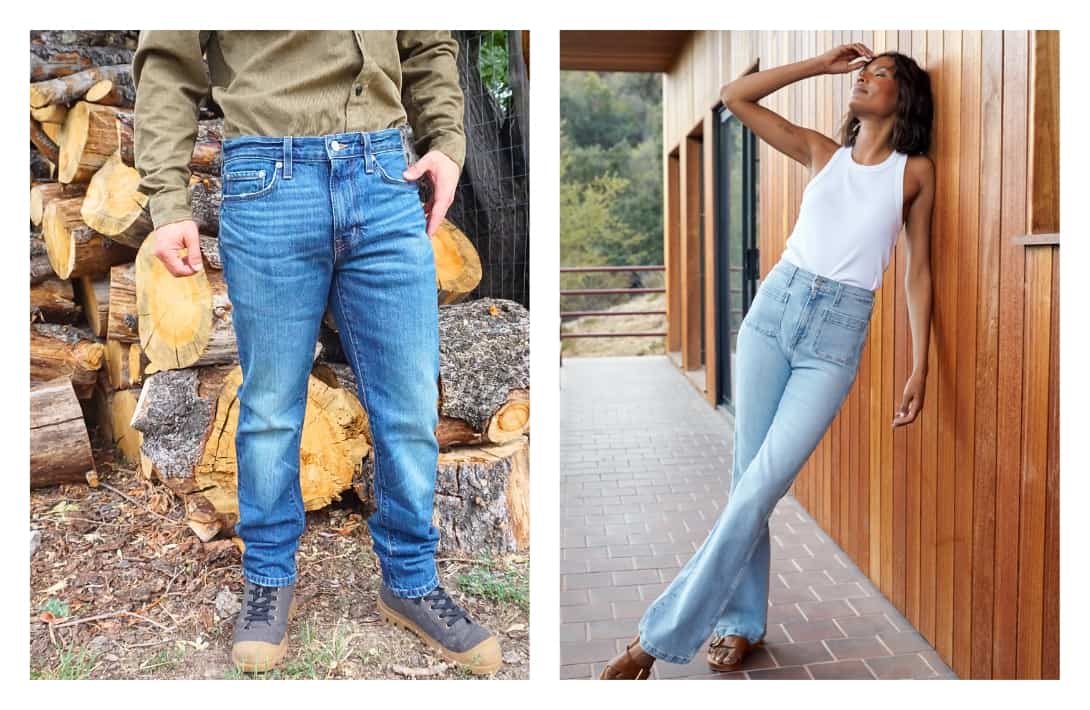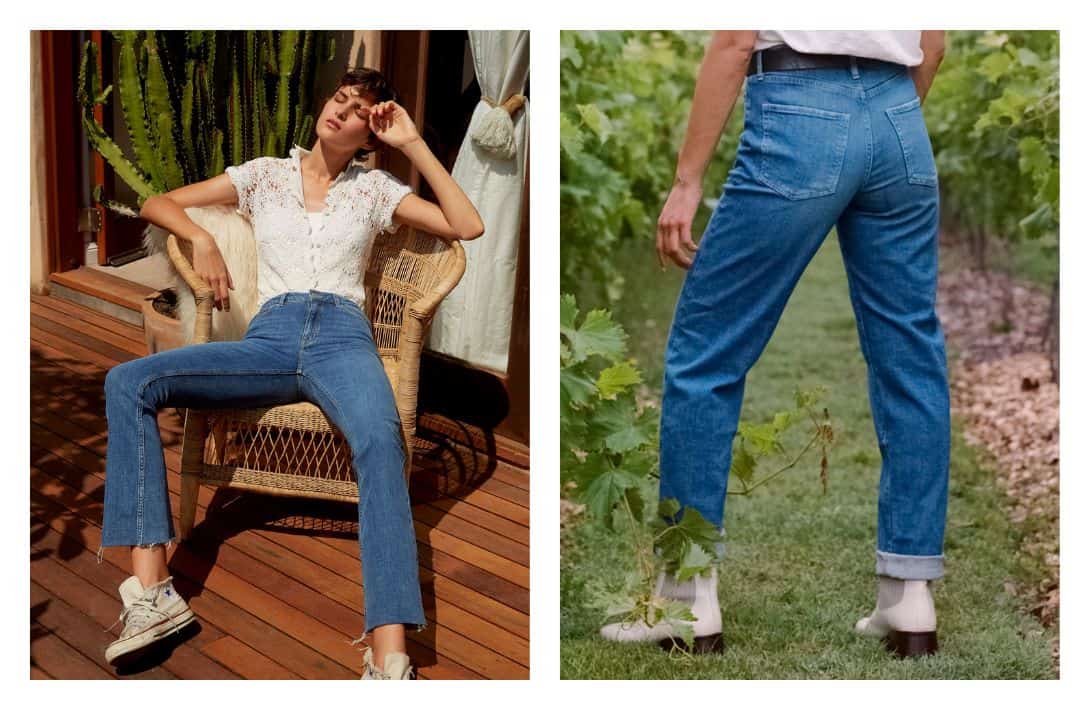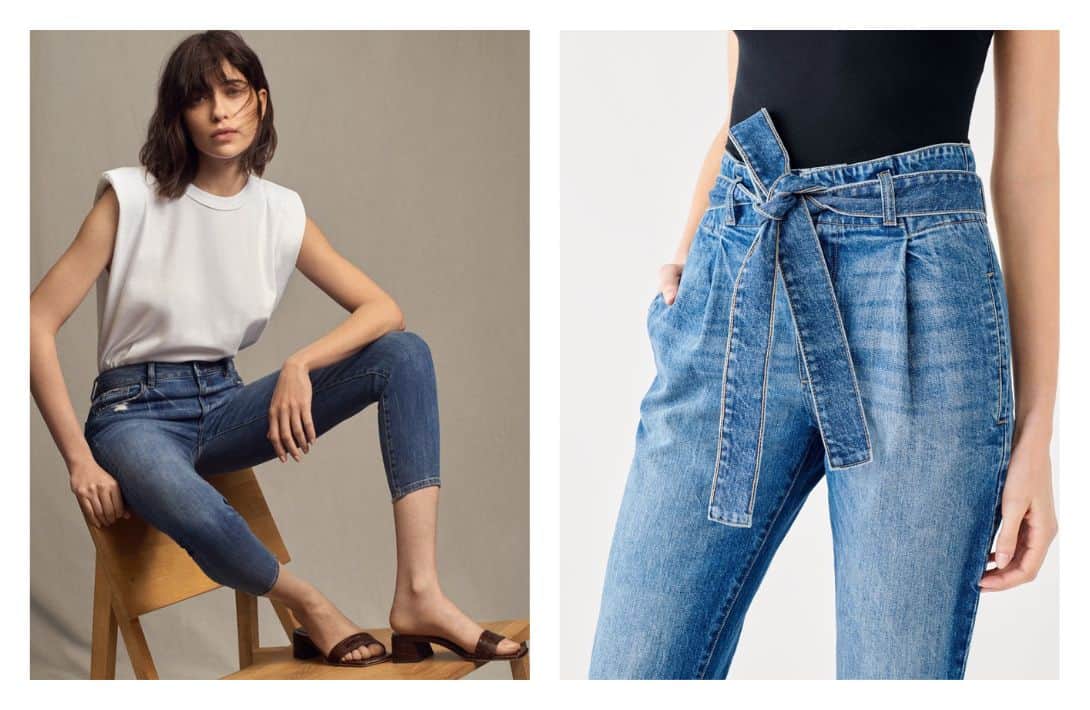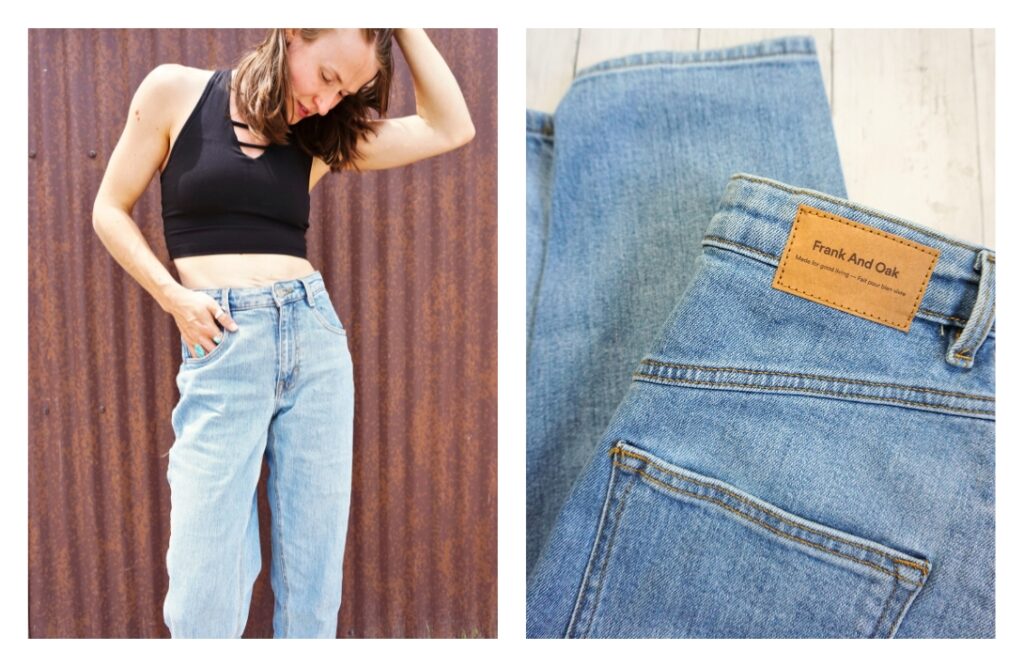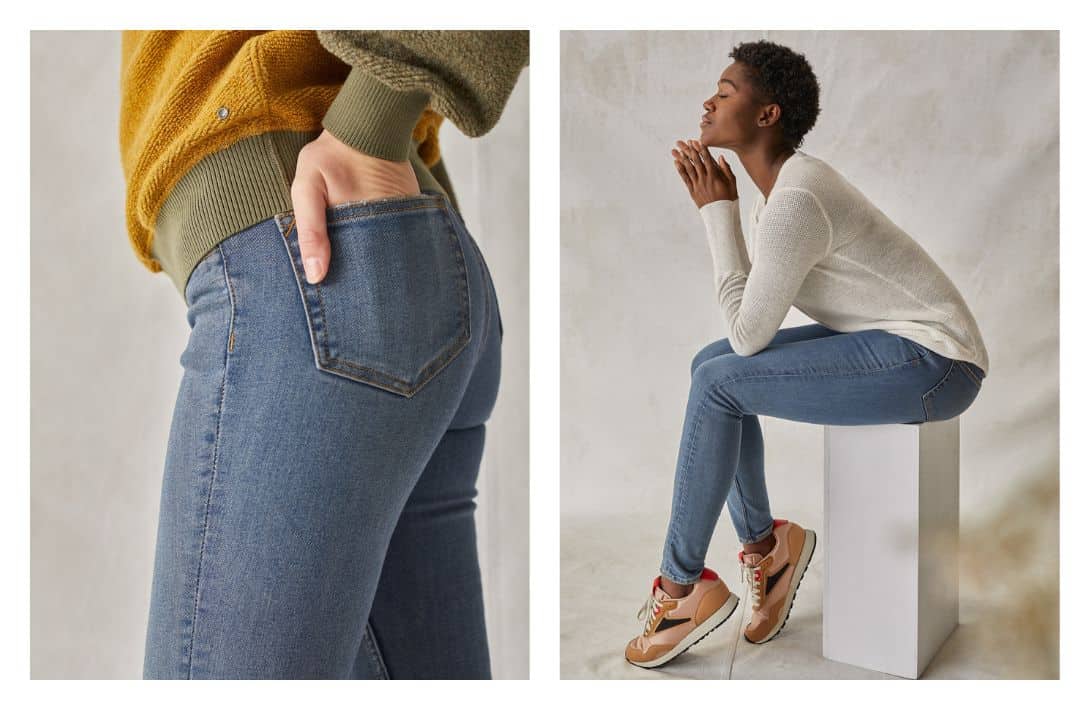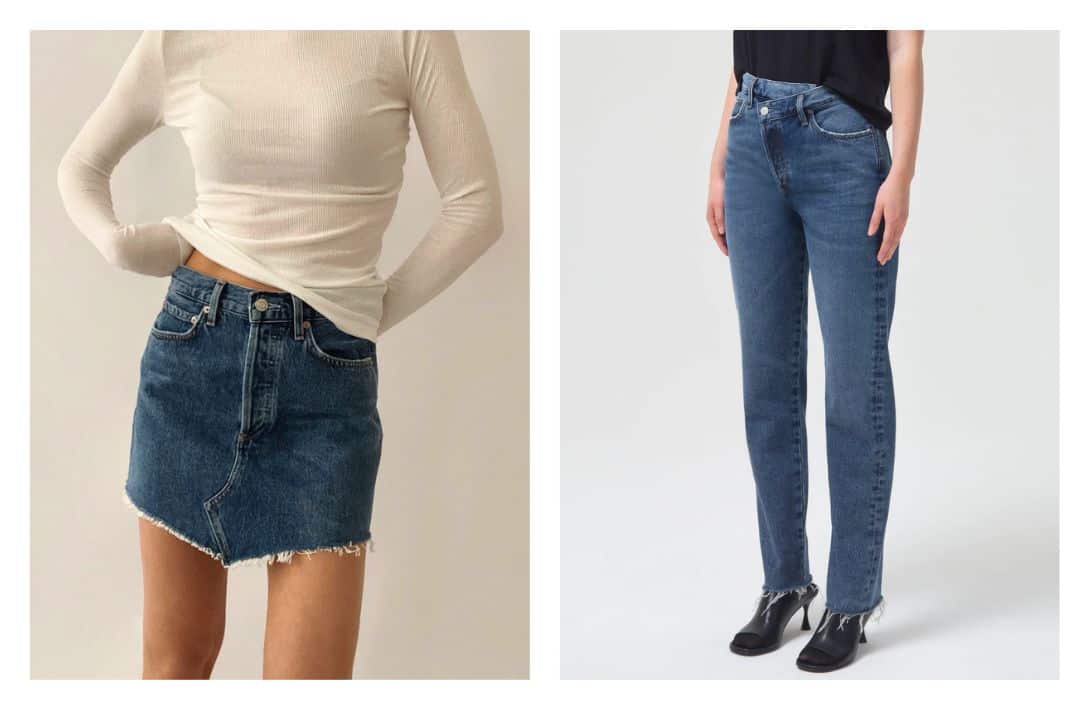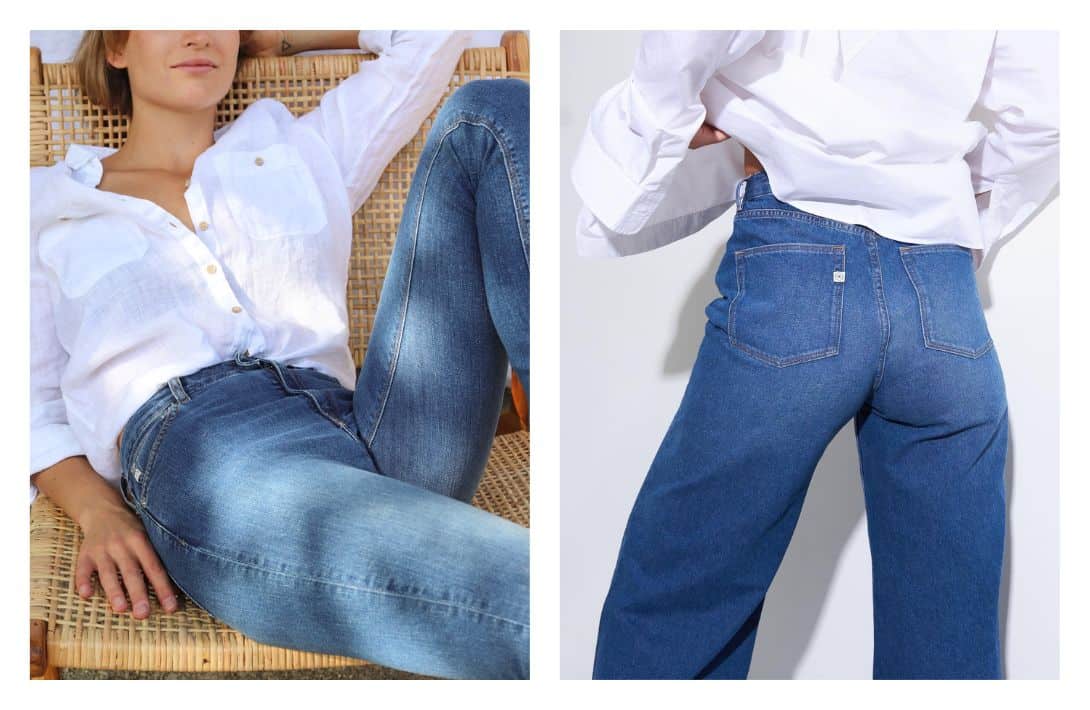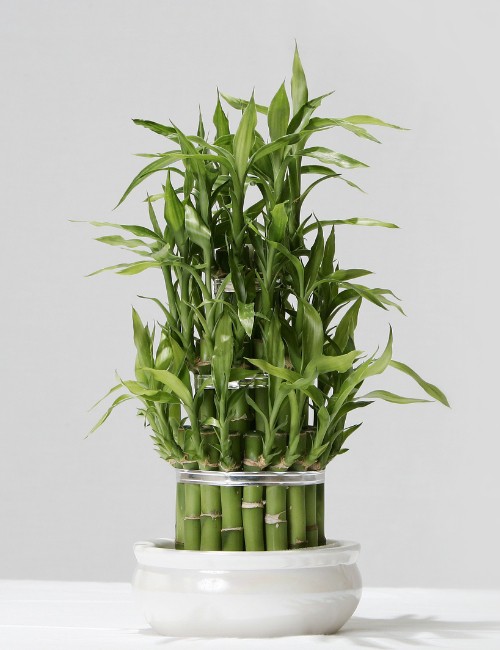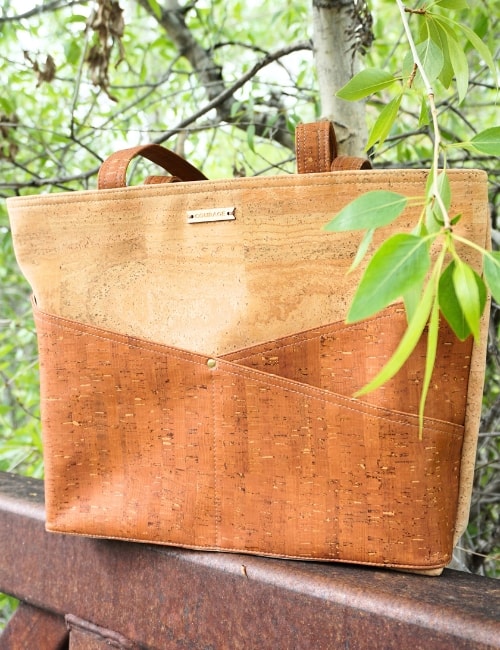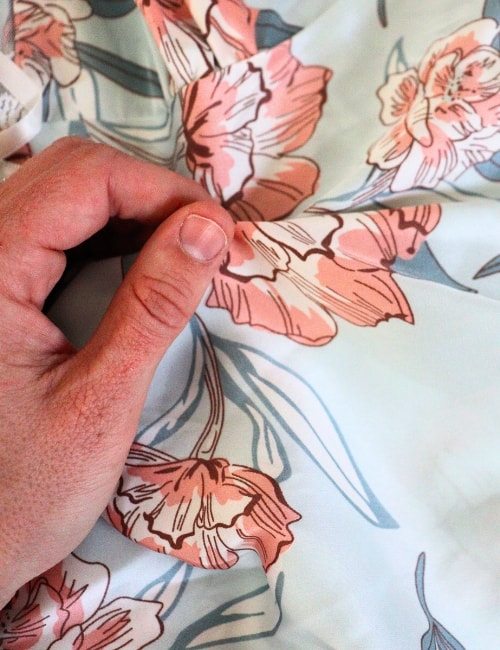11 Sustainable Jeans For More Ethical Do-Good Denim
Haven’t you heard? Green is the new blue.
For sustainable jeans, that is.
The problem is traditional denim is dirty, but blue jeans are a wardrobe staple. That’s why we think it’s time to fight to clean the jean.
And this is precisely what these ethical jeans companies are doing.
Everything we recommend to you on Sustainable Jungle is independently researched and we ask all brands to confirm their claims. To avoid waste, we test products on an as needed basis. This post contains affiliate links. If you buy something through our links, we may earn a small commission. Learn more about why we do this here.
The Top Sustainable Denim Brands For Eco-Conscious Curves
What is an eco alternative to denim?
Going nude, for one. Or, if you live in society, Nudie Jeans fits the bill. Their versatile fits, eco-friendly materials, and lifetime repairs make them a jean come true.
Consistent innovation, durable pieces, and timeless designs make AG Jeans another contender for best pair of ethical fashion jeans.
MUD Jeans not only uses recycled cotton and circular practices, but compensates for their remaining impact with carbon offsets to boot (cut).
Head to the bottom of the article to see how we found the best sustainable jean brands.
The Full List Of Sustainable & Ethical Jean Brands
- Nudie Jeans | Visit Store
- AG Jeans | Visit Store
- Warp + Weft | Visit Store
- Reformation | Visit Store
- Outerknown | Visit Store
- Outland Denim | Visit Store
- DL 1961 | Visit Store
- Frank And Oak | Visit Store
- prAna | Visit Store
- AGolde | Visit Store
- MUD Jeans | Visit Store
1. Nudie Jeans
About Nudie Jeans
Price Range: $185–$400
Nudie Jeans provides some of the best sustainable jeans on the market.
They use recycled, fair trade, or organic cotton to make every pair of jeans—whether it be a skinny, bootcut, straight leg, or tapered fit.
We love the Everblack Breezy Britt jeans for the oh-so high-waisted fit, durability and flattering tapered cut which drapes really well for this type of garment.
Nudie Jeans’ Ethical & Sustainability Practices
Materials:
Around 95% of all the fibers used in Nudie’s environmentally friendly jeans are cotton that’s Organic, Fairtrade, or Recycled.
The company also created the Nudie Jeans Material Tool, based on Made-By’s Environmental Benchmark for Fibers, and the Higg Materials Sustainability Index (MSI) to help guide their designers on preferred materials.
Products with human-made cellulosic materials, like TENCEL™, are certified by Sustainable Forest Management.
Supply chain & labor practices:
Nudie is a member of the Fair Wear Foundation, ensuring fair working conditions across its entire supply chain.
They conduct around ten annual audits to ensure their partners follow their Code of Conduct and Labor Practices, and back their Transparency Pledge by publishing its complete list of suppliers.
Carbon commitments & green practices:
All suppliers adhere to a chemical Policy, including a Restricted Substance List (RSL), and Manufacturer Restricted Substance List (MRSL).
Every pair includes a promise of free lifetime repairs. They also provide customers with a free Repair Kit if they can’t find a Repair Shop or Repair Partner.
Customers can return old jeans for recycling and receive 20% off new Nudie duds.
Nudie Jeans is a part of the UPS Carbon Neutral Program, offsetting CO2 emissions from exports, imports, and returns through reforestation and installation of renewable energy facilities.
Their packaging supplier, Avisera, plants trees to compensate for their carbon emissions, too.
All products are shipped in plastic bags made from RE-LDPE and RE-HDPE, which are recycled plastics containing around 40–80% recycled materials.
Inclusivity:
The ethical women’s jeans are available in 24–36″ waists and 26–36″ lengths. Men’s sizes are available in 24–38″ waists and 28–36″ lengths.
2. AG Jeans
About AG Jeans
Price Range: $168–$298
AG Jeans has taken a slow, methodical approach to sustainability by introducing new technology and programs each year.
The denim jeans have exceptional quality, unique washes, and classic silhouettes, like high-rise skinny, cigarette leg, and straight.
We love their sustainable wide leg jeans, like the Deven, for a subtle elongated look that never goes out of style.
AG Jeans’ Ethical & Sustainability Practices
Materials:
AG Jeans implemented state-of-the-art water filtration systems in their sustainable denim production. This Ozone Technology cuts water consumption by 50%, while minimizing the use of chemicals and energy.
Many of AG’s textiles incorporate sustainable materials, like TENCEL™ lyocell and modal fabric.
Supply chain & labor practices:
AG’s direct suppliers adhere to its Code of Conduct and Standard of Engagement, which prohibits human trafficking or slavery.
They also conduct announced and unannounced audits at their partner facilities in Los Angeles and Mexico.
Carbon commitments & green practices:
AG has taken several steps to become more sustainable, like installing solar panels, introducing water recycling systems, and using eco-friendly lasers for manufacturing.
They continually invest in technology to increase energy efficiency, such as heat-saving recycling equipment that reduces laundry energy consumption by nearly 50%.
By carefully cut patterns, they minimize fabric waste, doing so further by recycling discarded denim scraps for home and car insulation.
Inclusivity:
Women’s sustainable jeans are available in sizes 22–33″ and low to ultra-high rises.
Men’s sizes range 28–42″ and inseams 29–36″.
Community & charitable giving:
GOOD KARMA is the company’s charitable initiative. They partner with various organizations, like Water For People, Boxed Water, and Heal the Bay, to make a positive impact on the world.
3. Warp + Weft
About Warp + Weft
Price Range: $88–$98
Warp + Weft is an eco-friendly denim company forging a name for themselves in a sea of unsustainable options.
How?
By offering a vast selection of designs for men, women, and kids alike. At under $100 per pair of jeans, they offer affordable ethical jeans, too.
The PHX Plus Denim Shorts are a vintage denim-inspired cutoff with a light wash, high-rise fit. The raw hem gives it a casual aesthetic, perfect for the summer.
Warp + Weft’s Ethical & Sustainability Practices
Materials:
Aside from their rigid denim classic jeans (98% cotton and 2% elastane), most are made of an eco-friendly stretch denim blend of cotton, modal, lyocell, and plastered (a type of polyester).
Warp + Weft does not exclusively use organic cotton but is working towards it. For now, they source BCI cotton, aiming to teach suppliers about more sustainable cotton farming practices.
Supply chain & labor practices:
Aside from a small team of ten based in New York, all Warp + Weft jeans are created in Pakistan, including farms, mills, and factories.
They are fully compliant with the International Social and Environmental & Quality Standards.
Carbon commitments & green practices:
By using vertically integrated dyeing and washing processes, Warp + Weft recycles 98% of the water used to create their jeans.
Inclusivity:
With “75 sizes and body types represented”, they’re hands down the most inclusive and body-positive brand on this list. Women’s sizes range from 00 to 24.
For Warp + Weft’s eco-friendly men’s jeans, sizes mostly range from 28–42″ waist and 28–34″ inseam, though they offer extended “big and tall” sizes up to 48″ waists and 36″ inseams.
Community & charitable giving:
Once you add an item to your cart, you have the option to donate $3 towards clean water and well projects in Malawi. Warp + Weft matches every donation made.
Their second giving initiative, No Kid Hungry, provides food for low-income kids.
4. Reformation
About Reformation
Price Range: $78–$248
Reformation is one of the best sustainable denim brands, with tons of women’s fashion items and a whole kit-and-kaboodle of eco-cred to their name.
RefJeans,’ “smart ass jeans” for women are not only super sustainable and affordable but varied in styles and washes.
While these high-waisted smokin’ hot sustainable mom jeans are so popular you might have to get on a waitlist, our favorite is the Cynthia High Relaxed.
Reformation’s Ethical & Sustainability Practices
Materials:
We like the Cynthia because it’s made of 43% TENCEL™ lyocell fabric and 57% organic cotton grown with regenerative agriculture practices.
Most other styles are made with that same blend or an 80/20 blend of 80% regenerative and recycled cotton. Only a couple models feature 1% EcoLycra or elastane.
RefJeans relies on a biodegradable natural enzyme for washing and dyeing their jeans.56% of Ref’s dyeing partners are either bluesign® or OEKO-TEX-certified against using harmful chemicals.
Supply chain & labor practices:
Reformation owns 32 of its factories in downtown Los Angeles, and 65% of its garments (including all denim) are made in one of these.
Their small percentage of other factories in Morocco, Turkey, and China, as are all suppliers, uphold the Global Social Compliance Programme’s (GSCP) Code of Conduct.
Carbon commitments & green practices:
Reformation has a lot of sustainability initiatives, such as assessing the impact of each garment, using wind-powered and Green Business-certified office buildings (right down to the eco-friendly office supplies), shipping in bio-based packaging, and selling climate credits.
Thanks partly to their habit of buying carbon offsets for almost everything (even the energy your computer uses to browse their website), they’ve been carbon and water neutral since 2015.
Reformation signed onto the Circular Fashion System Commitment, setting the goal to recirculate 500,000 garments by 2025.
Inclusivity:
RefJeans are normally available in 23–31″ waists (0–12), but their Liza Ultra High Rise sustainable plus-size jeans come in sizes 32–38”.
Community & charitable giving:
Reformation donates to rotating organizations, like donating 1,000 gallons of credits to the Bonneville Environmental Foundation to support clean water projects for every pair purchased.
They also plant trees for each staff member’s birthday, host company-wide volunteer days, and give all employers a day off each month to volunteer.
5. Outerknown
About Outerknown
Price Range: $168–$328
As the brainchild of eleven-time World Surf League champion Kelly Slater and designer John Moore, Outerknown has the sea at heart.
Hence their men’s and women’s Sea Jeans, each with a happy mix of casual chic and outdoor capability.
Men’s various blue and black jeans come with either slim, straight, or Selvedge cuts. Ladies come in a high rise, boyfriend, or cropped.
The patch pockets on the Paramour Flare offer a unique touch to the ’70s-inspired light-wash jeans that we can’t get enough of.
Outerknown’s Ethical & Sustainability Practices
Materials:
Outerknown’s jeans are typically made of organic and recycled cotton.
A small handful contain some stretch fabrics (like spandex), so be sure to check the label.
Supply chain & labor practices:
Outerknown uses bluesign® and fair trade certified factories and Fair Labor Association-compliant suppliers.
The denim comes explicitly from the Candiani mill in Milan, Italy, and is otherwise washed and sewn in Vietnam’s Saitex, one of the leading eco-friendly jeans factories.
In addition to their living wages, they pay a premium, which goes into a fund that the employees collectively decide how to use.
Carbon commitments & green practices:
These fair trade jeans are made in small batches on vintage hand-operated looms. No machines are necessary.
Sea Jeans are also guaranteed for life, so Outerknown will replace or repair them for free forever.
If they do fully wear out, this slow fashion brand offers a take-back program that recycles jeans.
Inclusivity:
Men’s sustainable jeans are available in 28–38″ waists and 30″, 32″, or 34″ inseams. Women’s jeans come in 24–32″ waist sizes.
6. Outland Denim
About Outland Denim
Price Range: $190–$200
Australia, sustainable denim, ethical manufacturing practices—what’s not to love about Outland Denim?
The eco-friendly jean brand uses sustainable materials to craft high-quality jeans—and sustainable denim jackets, hoodies, shorts, skirts, dresses, and overalls—that don’t impede human rights or the environment.
One of our favorite pairs is the timeless Cooper slim cut, featuring those classy ultra dark washes and a fabric content of over 90% organic cotton.
Outland Denim’s Ethical & Sustainability Practices
Materials:
Outland primarily uses organic cotton to develop their eco-friendly jeans, with some pairs including lyocell, recycled cotton, virgin polyester, and recycled polyester.
All of the sustainable jean brand’s patches are made from vegan-friendly jacron paper that bears bluesign® and OEKO-TEX certification.
Outland prioritizes natural indigo dyes but ensures any sustainable dyes are certified organic or have been tested for harmful chemicals.
Supply chain & labor practices:
Outland established its own Cut, Make, Trim (CMT) and Wash House facilities, using technology that minimizes its carbon footprint.
Staff is supported by four pillars: training, opportunity, living wages, and education. Employees can participate in education and personal enrichment programs, like budgeting, health, computer skills, and self-defense.
Outland Denim has achieved 100% traceable denim and they only work with facilities free of slavery and exploitative practices.
Carbon commitments & green practices:
100% of excess textile waste from Outland Denim’s production facility is used for textile recycling research, not-for-profit social enterprises, and organizations for awareness projects.
The sustainable denim manufacturer has also made efforts to switch to cassava bags and reduce water, energy, and chemical usage.
Inclusivity:
Sustainable jeans for men are available in sizes 28–40″; ethical jeans for women in 22–34″.
Community & charitable giving:
Through a partnership with Precision Solutions Group (PSG), Bossa Denim, and Nudie Jeans, they created the Supply Network Intelligence System—a system to support cotton farming communities in Turkey.
The Outland Denim Medical Clinic was established at the Cut and Sew facility in Kampong Cham, Cambodia, to provide resources, education, and services to their community.
7. DL 1961
About DL 1961
Price Range: $88–218
It’s time to stop keeping traditional denim problems on the DL. Enter DL 1961.
This New York-based family-owned brand has been making quality jeans for decades. Now they’re run by Sarah Ahmed (whose sister runs the brand Warp+Weft).
Whether you’re looking for eco-friendly men’s jeans, women, kids, or your zero waste dog (seriously) DL 1961 tons of classic choices in most shapes and cuts, from baggy to butt-hugging.
The eye-catching wash and antique silver hardware on the Cobalt Blue Noah vintage denim heabs make it a one-of-a-kind pair.
DL 1961’s Ethical & Sustainability Practices
Materials:
Most are 100% cotton, all of which is either certified OCS or GOTS-certified organic, or has GRS or RCS recycled content certifications.
For performance-enhanced designs, however, they blend in Lenzing™ Modal, TENCEL™, or Refibra Lyocell, along with some occasional polyester and Lycra for stretch.
They eliminate harmful chemicals and bleach using Jeanologia Ozone water-free zero-discharge washing and laser finishing.
They’re also one of just 12 mills on the planet to use Dystar 40% VAT, a pre-reduced indigo blend with no harmful byproducts.
Supply chain & labor practices:
All farms and factories located in Pakistan are fully compliant with International Social and Environmental & Quality Standards.
Employees work in fair and safe, chemical-free environments.
Carbon commitments & green practices:
A pair of DL jeans requires 10 gallons of water–compared to 1800(!) gallons in a pair of conventional denim jeans—and they recycle and treat that in-house.
Their eco-friendly jeans factory is considered an energy-efficient “green building” which uses a combination of solar panels and an onsite self-power generated heat recovery system.
Inclusivity:
Men’s sizes encompass 28–42″ waists and 30″, 32″, and 34″ inseams, and women’s 23–34″ waists, plus eco-friendly maternity jeans that provide midsection stretch.
Community & charitable giving:
DL1961 donates excess textile scrap to the non-profit FABSCRAP, so it can go back into something good and reduce landfill waste. Killing two birds with one stone wash!
8. Frank And Oak
About Frank And Oak
Price Range: $119
From Canada comes one of the best sustainable affordable denim brands around: Frank And Oak.
Their line of hydro-less, circular, and organic denim is setting a new denim standard by encouraging people to recycle their denim again and again.
They offer an array of classic and timeless styles and cuts for both men and women.
We’ve tried out the women’s Linda High-Rise and feel anything but blue about their performance.
Featuring a flattering yet comfortable high-waist design and roomy balloon shape in the legs (for those of us who don’t like their jeans skin-tight), we can honestly say these are some of the most comfortable jeans we’ve worn.
Thanks to their Wafer fabric technology, the fabric “offers superior moisture management and wicking performance”, and we can confirm this is true after use. Even in the summer months, these jeans stay super comfortable and dry during all-day wear.
We’re also impressed with how thick and durable the fabric is while also managing to feel broken-in right out of the package. For a pair of go-to everyday jeans, these are a definite winner.
Frank And Oak’s Ethical & Sustainability Practices
Materials:
Frank And Oak’s “good denim” is made of mostly organic and partially recycled cotton, along with a touch of elastane (1%) and sometimes TENCEL™ lyocell.
The zipper is made of NATULON® recycled polyester zipper tape, and the back patch is vegan recycled polyester, too.
Instead of chemical dyes, they use plant-based dyes and water-extracted minerals.
Supply chain & labor practices:
As a Certified B Corp, Frank And Oak is held to rigorous manufacturing standards across each of their 28 factories in three countries (China, Bangladesh, and UAE).
Each one has signed their code of conduct and been audited by at least one organization, including Sedex, WRAP, BSCI, and SA8000. All have passed these audits with “excellent” or “very good” ratings.
Carbon commitments & green practice:
This brand’s sustainable denim is “hydro-less denim”, which uses 95% less water, 50% fewer chemicals, and 79% less energy than conventional denim manufacturing. Any mineral extraction waste from this process is used as bio-fuel or fertilizer.
Plus, all denim is designed for easy recycling (such as being rivetless). Specifically, you can recycle old Frank And Oak jeans via their partnership with Cotton’s Blue Jeans Go Green™ program. In fact, bring any pair of jeans to a Frank And Oak store for 15% off a new pair.
Eco-friendly materials are a priority all-around, making up 78% of their line and their offices and stores (which utilize recycled, locally sourced materials).
Frank And Oak’s packaging consists of recycled paper kraft boxes and composable polybags,
Inclusivity:
Sustainable women’s jeans come in waists 23″ to 32″ and men’s in 28″x32″ to 38″x34″.
9. prAna
About prAna
Price Range: $95–$120
As a long-standing sustainable outdoor clothing brand with a reputation for quality backed by top athletes, prAna is a go-to if you’re looking for functionality at no cost to comfort or sustainability.
Their affordable sustainable denim is no exception.
Their ladies’ jeans come in straight, skinny, tight, relaxed, cuffed, cropped, and colored variations.
The men’s selection offers skinny fits, like the Bridger in more than your basic blues. Choose between Peat, Mud, Black Out, Indie Blue, Denim, and Sepia washes.
prAna’s Ethical & Sustainability Practices
Materials:
Any cotton present in prAna Jeans is 100% organic. However, this organic cotton is often blended with Sorona® Polyester and Lycra ® Elastane, which gives them their active edge.
It’s not perfectly sustainable, but over 80% of each pair is organic cotton.
Supply chain & labor practices:
prAna may have a multinational supply chain and a massive range of products. Still, they’re aiming to make it as transparent as possible by joining as members of the supply chain traceability entity, Textile Exchange.
Many garments are made in Fair Trade-certified factories, a number increasing year after year. Their website has handy “Fair Trade” and “country of origin” filters, so you can be sure you’re shopping as ethically as possible.
Carbon commitments & green practices:
prAna is a full-on bluesign® approved partner, so we know these affordable sustainable jeans contain the bare minimum of toxic chemicals.
Inclusivity:
prAna’s jeans come in 0–14 women’s sizes and 28–40″ waist sizes for men, with 30–34″ inseams.
Community & charitable giving:
prAna gives back through Outdoor Outreach, which gives disenfranchised urban youth outdoor adventure opportunities and educates them in outdoor leadership.
They also fund individual projects organized by their sponsored athletes and ambassadors, like youth girls’ surf camps.
10. AGolde
About AGolde
Price Range: $138–$458
AGolde sets the gold stard for sustainable fashion because it owns most of its facilities, allowing it to use high-quality manufacturing practices and equipment to produce unique styles like the Riley Jean, 90s, and Fusion—all available in various fits.
The Criss Cross is one of their more unique options, with an off-center button that draws the eye to the waist.
AGolde’s Ethical & Sustainability Practices
Materials:
AGolde’s ethically made jeans use eco-friendly materials like recycled cotton, and recycled leather.
The pocketing is crafted from recycled plastic bottles and post-industrial recycled waste.
Some of the Citizens of Humanity lines incorporate recycled thread in the stitching.
Supply chain & labor practices:
Many of their jeans are developed in Los Angeles and Turkey in facilities that AGolde owns. They cut to order, allowing product demands to drive their production to help minimize waste.
The laundry facilities utilize equipment for green washes and dyes, eco stones, ozone machines, natural enzymes, and organic chemicals—collectively minimizing chemicals, water, energy, and labor.
Carbon commitments & green practices:
AGolde uses oxo-biodegradable plastic with a pre-programmed life, meaning it automatically starts to break down over time.
All paper labels and tags are made from recycled paper.
Inclusivity:
In AGolde’s sustainable jeans, women’s sizes range from 22–33″ and low to high rise.
11. MUD Jeans
About MUD Jeans
Price Range: €129–€159
MUD Jeans produces some of the best ethical jeans in the Netherlands.
As one of the first ethical denim brands to use recycled cotton and circular fashion techniques, MUD has paved the way for future brands in the fashion industry.
They use high-quality denim for skinny, flared, loose, straight, tapered, and slim cuts—alongside sustainable denim shorts, jackets, and skirts.
The Sky Rise Skinny is a classic cut, perfect for the office, date night, or running errands. It’s made from organic and recycled cotton, with 2% elastane and stainless steel buttons.
MUD Jeans’ Ethical & Sustainability Practices
Materials:
Most of MUD’s sustainable denim fabric is made from 60-75% OCS-certified organic cotton, with around 40% supplemented with recycled cotton.
Some of their denim pieces contain 30% hemp sourced from France and stretch jeans include a maximum of two percent GRS-certified recycled elastane.
The buttons on their eco-friendly pants are made of 100% stainless steel and use a printed label instead of leather patches.
Supply chain & labor practices:
MUD Jeans is a Certified B Corp and a member of The Social and Labor Convergence Program.
Their main supply chain partners have signed our Code of Conduct, and they regularly conduct in-person audits, seeking fair wages, safe working conditions, and respect for all employees.
Carbon commitments & green practices:
All of MUD’s sustainable pants are shipped in recycled cardboard.
The sustainable denim brand uses Ecochain to measure its carbon footprint and ensure the best resource use practices.
MUD is partnered with The Ellen MacArthur Foundation (EMF) and Circle Economy to move toward a more circular fashion system.
Inclusivity:
The sustainable men’s jeans are available in 28–38″ waists and 32–36″ lengths. Women’s sizes come in 25–34″ waists and 30–32″ lengths.
Community & charitable giving:
MUD Jeans supports several organizations, including the Sea Shepherd and Justdiggit.
Did you know we Have a Newsletter?
We cover the latest in sustainable living, fashion, zero waste, beauty, travel, finance and more…
Why Choose Eco-Friendly Jeans Brands?
First off: are jeans sustainable?
Traditionally, no.
Globally we consume about 1.2 billion pairs of jeans per year. Every single one of those requires 3,781 liters of water to produce.
In the UK, women’s jeans are considered to have the highest water footprint of all clothing.
Then there’s the chemical factor, first at the cotton farming stage. Most jeans are made with traditionally farmed cotton. Traditional cotton is hugely land and water-consuming, accounting for 16% of the world’s use of insecticides.
Those chemicals leach into the environment, deplete the soil of its natural nutrients, and can cause severe health defects in farmers and animals.
As for the manufacturing stage, the cotton fibers must first be bleached white and then dipped repeatedly in indigo dye in order to achieve a lasting, dark coloration. This, of course, leads to vast amounts of chemical runoff and wasted water.
After that comes finishing. There are many different techniques used here, and few of them are eco-friendly. The most common are stone washing and sandblasting.
Stonewashing means literally washing the jeans with pumice stones to make them look worn. The problem is pumice stone mining is responsible for a considerable percentage of carbon emissions. The dust generated by the process can also lead to respiratory health effects on the miners.
Similarly, sandblasting puts factory workers and their lung health at risk because it generates dust while the workers are literally blasting the jeans with abrasive sand using high-pressure hoses.
And in the end, out of those billion-plus jeans, less than 1% gets recycled.
How We Found These Sustainable Jeans
Are there eco-friendly jeans?
Yes! Perhaps a surprising number of them—which made picking out our favorite pair of jeans a tricky task.
Materials matter, but they’re not everything—so what is sustainable denim made of, really?
Materials:
What is the most sustainable denim fabric?
100% organic cotton, which uses 88% less water, and 62% less energy (along with no chemicals) than traditional cotton.
Other options include recycled or regenerative cotton (the latter of which is also usually organic), lyocell, or modal.
Many brands use small amounts of recycled and virgin synthetics for stretchy denim. This isn’t as great as being fully compostable and natural—but it’s not altogether bad if the synthetic content remains under 4%.
Under the materials class, we also look for sustainable natural dye jeans or those that use vegetable dyes and natural indigo.
- Certifications: Global Organic Textile Standard (GOTS), Better Cotton Initiative (BCI), Global Recycle Standard (GRS), OEKO-TEX, Organic Content Standard (OCS), Registration, Evaluation, Authorisation, and Restriction of Chemicals (REACH), bluesign®
Supply chain & labor practices:
Ethically produced jeans come from brands ensuring everyone is paid fair wages and works under safe, ethical conditions. First things first, we look for transparency.
It’s hard to tell if everyone is being treated fairly if we don’t know who or where our clothes are being made. So we ask #WhoMadeMyClothes?
If companies are sufficiently transparent, we then look for proof of fair wages, employee support, and working conditions. We can discern ethical denim production by looking for third-party audits and certifications to ward against greenwashing, though these can have greenwashing of their own…even B Corp.
- Certifications: Fair Trade, B Corporation, Worldwide Responsible Accredited Production (WRAP), Business Social Compliance Initiative (BSCI), Social Accountability International (SA8000)
Carbon commitments & green business practices:
Companies are working to reduce their environmental footprint in so many ways, and that’s where this category comes in.
It’s a catch-all for green initiatives like garment recycling programs, rental services, reducing and reusing textile waste, carbon offset programs, using renewable energy, having closed-loop fiber processing, and shipping plastic free.
Inclusivity:
Jeans should hopefully fit well, no matter how big, small, or curvy you are.
We always prioritize sustainable fashion brands with a wide range of sizes and promote body positivity by cultivating a supportive and well-rounded brand image.
Community & charitable giving:
We love brands out for more than just profit but want to make the world a better place by donating time, money, or support to various causes by raising awareness.
Final Thoughts On Ethical & Sustainable Denim
Blue jeans are a wardrobe staple and the epitome of comfort and practicality.
By choosing sustainable jeans brands, we’re setting the foundation for a more conscious collection of collecting all around.
What was once one of the worst fashion offenders (and no, we’re not talking double-denim) can now be your ethical alternative.
Remember, the most sustainable jeans are those you already own (or a second-hand pair). Though, if you do need to upgrade, learn about what to do with old jeans, so you can dispose of them responsibly.
There are numerous denim recycling programs, and several brands here will recycle your old pair for you.
If you found our list helpful, consider sharing this article with your friends and family to give them a leg up on finding a good pair of good old-fashion ethically-sourced jeans.
Pin these:
